Director and co-writer Ric Roman Waugh not only electrifies the already exhilarating “Fallen” franchise with ANGEL HAS FALLEN, almost doubling the amount of action set pieces as that seen in “London Has Fallen” while taking them to new heightened extremes, but takes it to new levels of storytelling that go beyond explosions, action, and Gerard Butler eye candy. Waugh, together with co-writers Robert Mark Kamen and Matt Cook, brings us a depth of story and character not previously seen in this franchise, and rarely seen in high octane action films. The result is mind-blowing, thought-provoking, edge-of-your-seat entertainment. And then Nick Nolte is added to the mix!
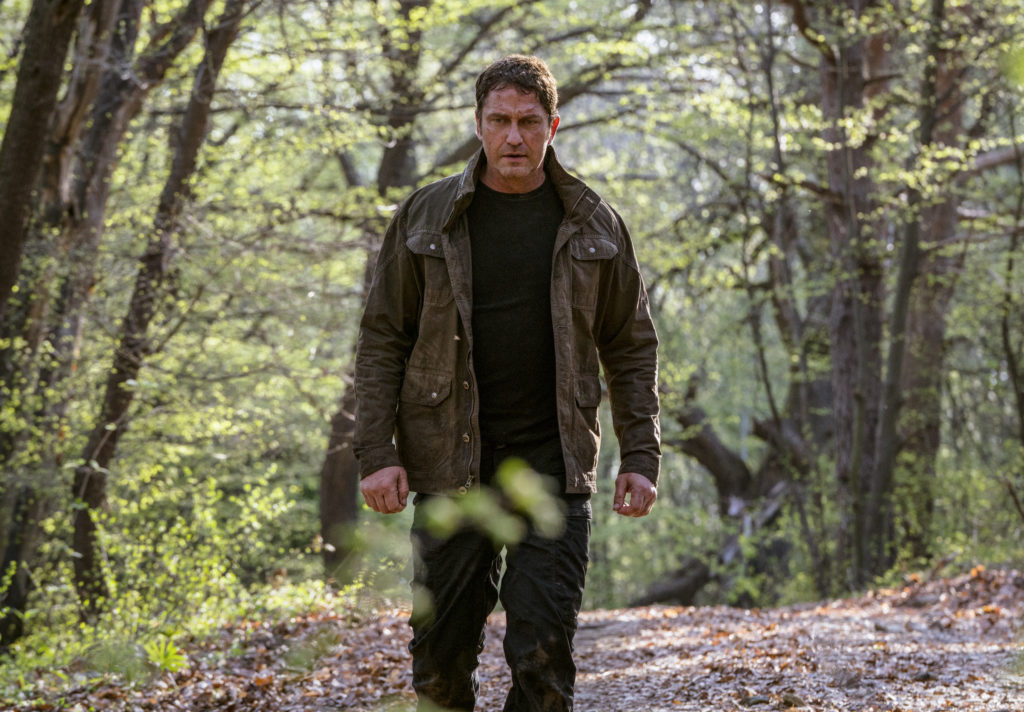
Mike Banning is back. Nursing his wounds after saving the White House, London, and the President in the last two “Fallen” installments, he is now a father to little Lynn and serving as Secret Service guardian angel to now-President Trumbull. Wife Leah is pushing Banning to step back from active duty and accept a hoped for offer to become Secret Service Director aka a desk jockey. But Banning isn’t quite ready to take a back seat to history just yet as we start to see just how much of a toll the past eight or more years have indeed taken on him. His C2-5 spinal area is severely compromised, as are his shoulders and knees; he suffers with migraines, insomnia, and nightmares; symptoms of PTSD are becoming visible, at least to Trumbull; and he’s living on pain pills to get through the day. But Banning won’t stop. It’s not in his DNA to stand down.
When we meet up with Banning again this go-round, he’s deep in active ops. He’s his usual one-man killing machine. Only unlike his prior high profile activities, he loses the battle here. As we quickly see, however, luckily these hard-charging ops are only a training exercise or Banning would be dead. And that’s something we aren’t used to seeing.

The one good thing to come out of this training though is that Banning gets to reconnect with his old military buddy Wade Jennings who owns and runs this facility and is looking to get set up with some private government mercenary contracts. Each man, lions both, has the life they dreamt of. Life is good. Or is it?
Heading back to D.C. and then out with Trumbull for a winter weekend escape from politics and to get in some time fishing on the lake, Banning is having some noticeable problems with dizziness. Trumbull tells Banning to head to shore. Rest. Send a relief agent out to guard him. After all, what’s going to happen in the middle of a lake.
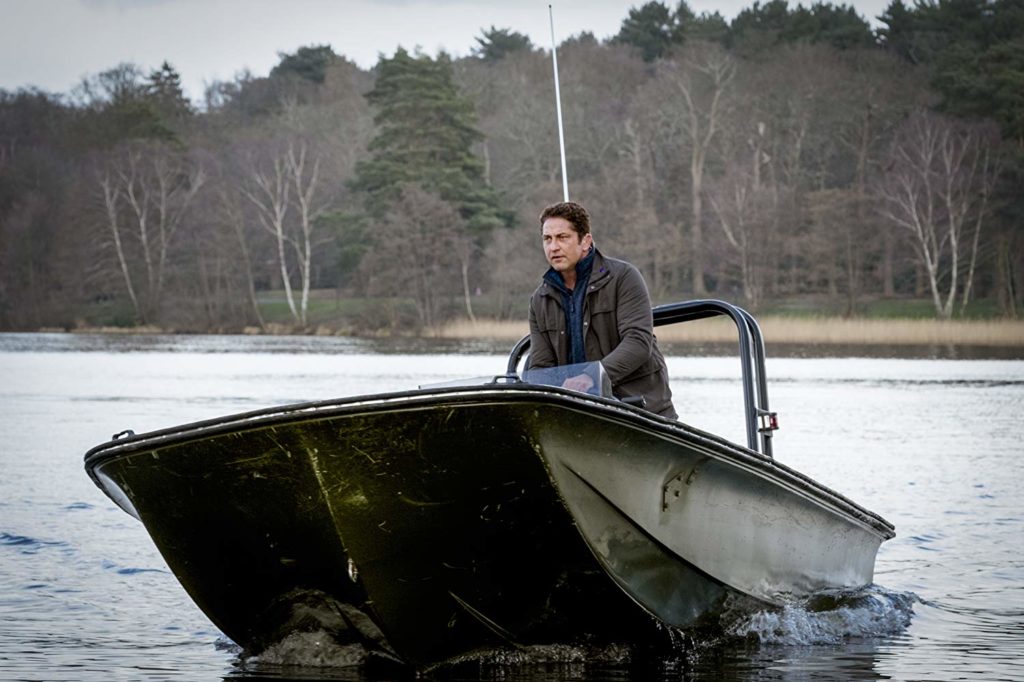
You know the old adage, anything that can go wrong will go wrong? Everything goes wrong here as a drone bombing strike swarms the lake and surrounding area, killing every agent but for one, Mike Banning. An assassination attempt on the President, it’s only thanks to Banning’s quick thinking and action that Trumbull is alive, albeit in a coma. But because Banning is the only agent alive and evidence at the scene and surrounding areas point directly to Banning as being the perpetrator, he becomes the FBI’s number one suspect in the crime.
Intent on clearing his name, the hunter becomes the hunted as Banning determines to not only find the people responsible for these acts but the reason behind them. And as all lions know, when being hunted, it’s best to stay downwind and out of sight. To do that, Mike Banning knows there’s only one place for him to go. To Clay Banning.

For the first time in his directorial career, Ric Roman Waugh has come into an established franchise, but makes it his, putting his signature stamp on it. Compromising nothing when it comes to the action in ANGEL HAS FALLEN, what elevates the film lies behind the action – an incredible story with powerful emotions. ANGEL HAS FALLEN has all the gravitas of Waugh’s prior works, “Felon”, ‘Shot Caller”, and the truth and reality of the acclaimed documentary “That Which I Love Destroys Me” which looks at PTSD of returning soldiers in today’s technologically advanced world of warfare. The emotional intensity of this story in its character study exploration of Mike Banning takes the franchise and AHF to a new level.
The first two films in the franchise were driven by action and Gerard Butler eye candy (Thank you VERY much!). But now we get to understand who Mike Banning is, what makes him tick, what drives him. Being an agent isn’t just a job to Banning. It’s a calling. But why? This story digs deep into Mike Banning and thanks to an emotionally layered performance from Butler, strong script, and equally strong emotionally driven lensing, we feel, we empathize, and we also ask questions thanks to tactfully developed ambiguity and metaphor.
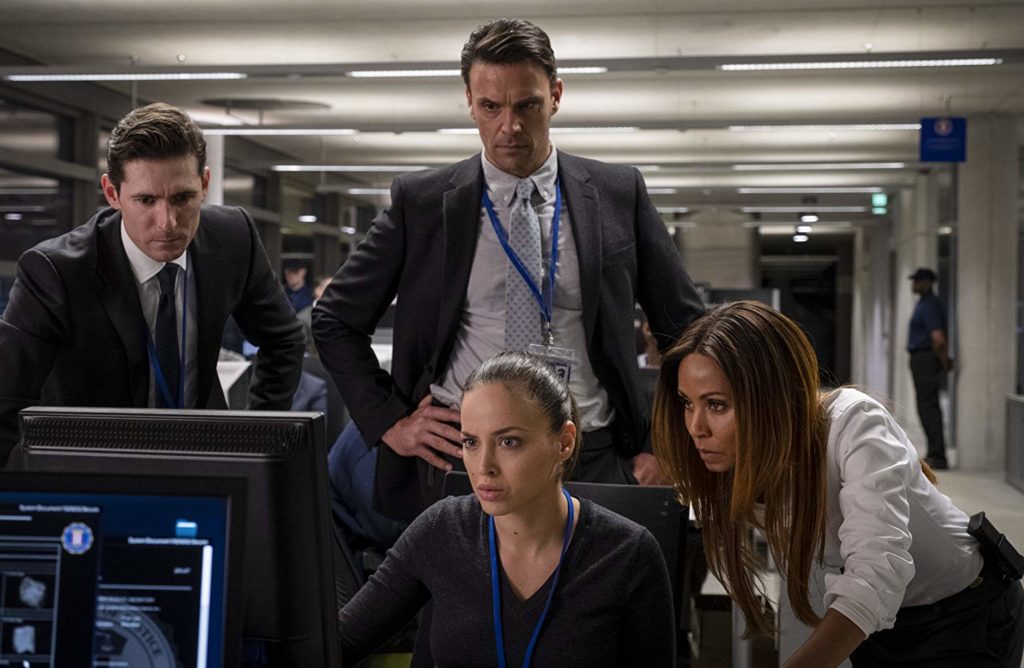
The story construct and structure is well done. Rooted in reality. Realistically shaped. Our socio-political climate is keenly incorporated into the mix as a resonant driving force for the plot. AHF speaks to the ties that bind, be it blood relations, military brotherhood, politics, power, money and greed, loss. But the most interesting aspect of AHF is the introspection of Banning and then tossing in the introduction to his dad, Clay. The past two films Mike has been an indestructible robot, almost a machine. But now, we see cracks in the veneer. We see self-worry and self-questioning. And THIS is what sets AHF apart from the franchise. It fascinates as this rock of a man shows vulnerability. It’s relatable. Humanizing. Palpable. And Butler brings that to the forefront in spades while cinematographer Jules O’Laughlin and his crew capture it all up close and personal. But we don’t just see the cracks. Butler, Waugh, and company explore them.
Already a fan of O’Laughlin’s work thanks to “The Hitman’s Bodyguard” and what he did with framing and lighting, with AHF he takes that to the next level, here meeting the challenge of establishing a visually tangible internalized character exploration with extreme extreme close-ups, and then turning the tables with beautiful bright, light metaphor as emotional complexities are laid bare. The careful eye will note that the ECU’s are reserved for the characters of Banning and Trumbull. Camera dutching raises red flags on multiple levels, casting doubt on accusations against Banning while casting aspersions on a multiplicity of other individuals. Is there a mole in the Secret Service? The FBI? A traitor? Notable is how the camera emotionally plays with Jada Pinkett Smith’s FBI Agent Johnson and others in the “inner circle of trust.”
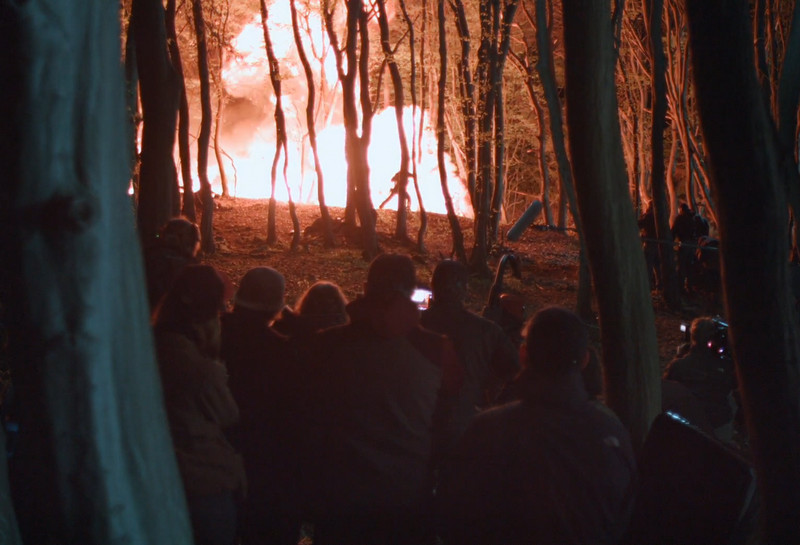
A real standout with the cinematic canvas is the work of Second Unit Director Vic Armstrong. A legend in the stunt and action world as both a stuntman (stunt double for Harrison Ford and Roger Moore) and director, here, Armstrong and Waugh essentially run two units simultaneously to capture from multiple angles some of the most insane action on screen today. A lot of handheld and steadi-cam work with the action immerses the audience in the moment. Serving as stunt coordinator is Greg Powell whose fight choreography and man-on-man stunt work is exemplary.
We first saw this pulled off by Waugh with Dwayne Johnson in “Snitch” and now we see it again in the hands of Gerard Butler and Vic Armstrong – a high speed modified “grasshopper” stunt with an 18-wheeler doing a partial rollover/semi-jump on a bridge. Only this time, it’s shot at night, in a forest, on a single lane road and bridge, with no lights but for those adorning the edges of the 18-wheeler, headlights, and an occasional chopper beam. An edge of your seat thrill that speaks volumes as to what’s at stake for Banning! And folks – this is not CGI. But how about fireball explosions in what has been coined by the cast and crew as “Napalm Alley”? Waugh tops “Apocalypse Now” for the number and size of these explosions. Again, done practically. The body count is also astronomical.
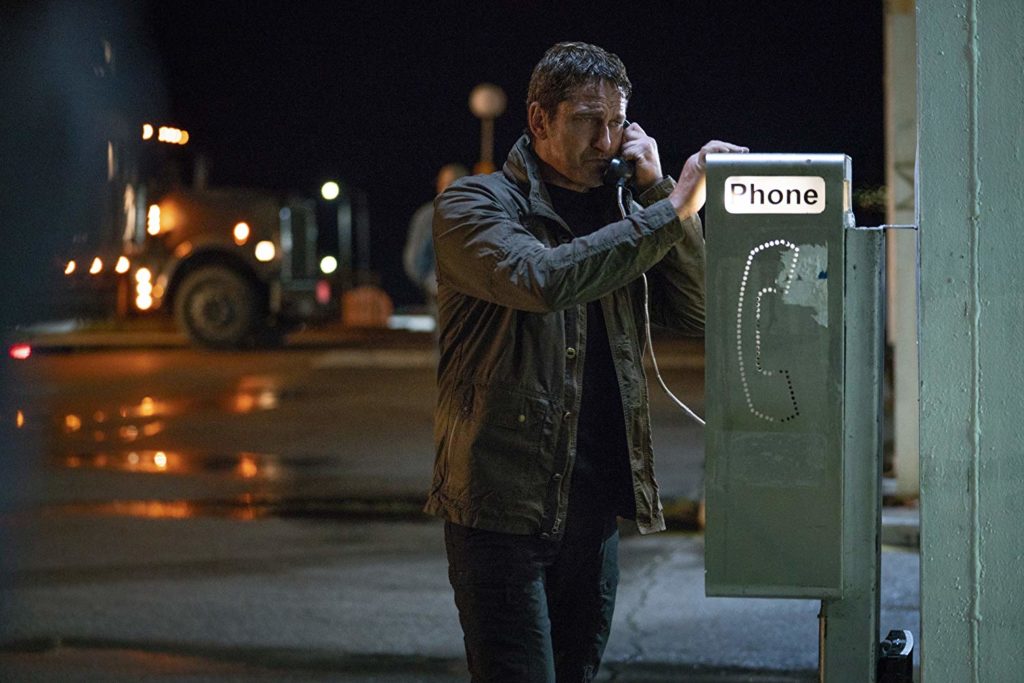
Kudos to production designer Russell DiRozario who dazzles us with his work in designing Clay’s cabin and underground tunnels. The detail within this “self-sustaining” analog cabin is telling of Clay’s past and his understanding while concurrently speaking to that of Mike and the dynamic between the two men.
Always wanting authenticity at the forefront of every story and film, Waugh left no stone unturned when it comes to AHF, calling on friends in the Secret Service as well as those involved in the cutting-edge swarm drone technology. This isn’t science-fiction or something “in the future”. What we see onscreen is the here and now.
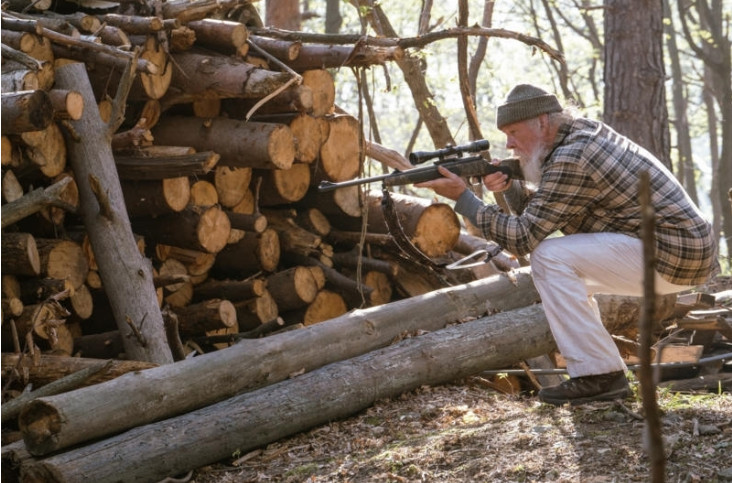
Gabriel Fleming’s editing is tight. Pacing keeps moving – and not just from the action – but from the emotional turmoil within Mike. . .and then the humor from Clay! Once Clay enters the fray we have some respites of humor that are beyond delicious and while Fleming’s comedic timing with the edits is exemplary, it’s Nick Nolte who sells each line, look, and moment.
Going beyond Gerard Butler and Morgan Freeman, who appear on screen together in the same scenes for the first time in the franchise, casting is exemplary starting with Danny Huston as Wade Jennings and moving into Tim Blake Nelson as VP Kirby and beyond. Jada Pinkett Smith walks a double-edged sword as we aren’t quite sure which side of the street she’s truly walking. Similarly, Lance Reddick; while we know which side of the fence Gentry is on in terms of dedication to the job, we’re not sure where his heart or his mind lies. The performances all strike a wonderful tone of ambiguity. And of course, Nolte just soars. He and Butler together are liquid gold, feeding and fueling each other. As of this moment, for my money, he’s in the running for Best Supporting Oscar nods.
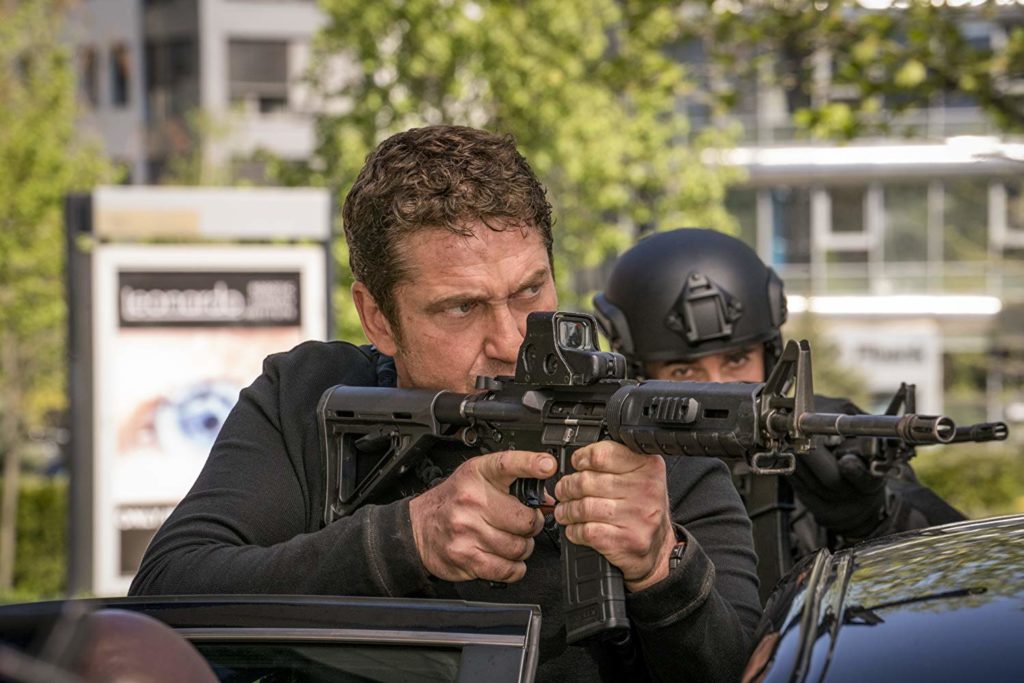
Another fresh take on the franchise comes in terms of the score courtesy of David Buckley. A total departure from the first two films, Buckley delivers a score filled with dramatic weight and gravitas versus well known anticipatory high-octane action notes.
At the end of the day, ANGEL HAS FALLEN comes down to exhilaration and excitement, emotion and empathy. Internal emotion and what makes a man tick, no matter what side of the fence he’s on. Empathy in understanding that man beyond the surface. And as for exhilaration and excitement? It’s Gerard Butler. It’s Mike Banning. It’s a Ric Roman Waugh film. Need I say more?
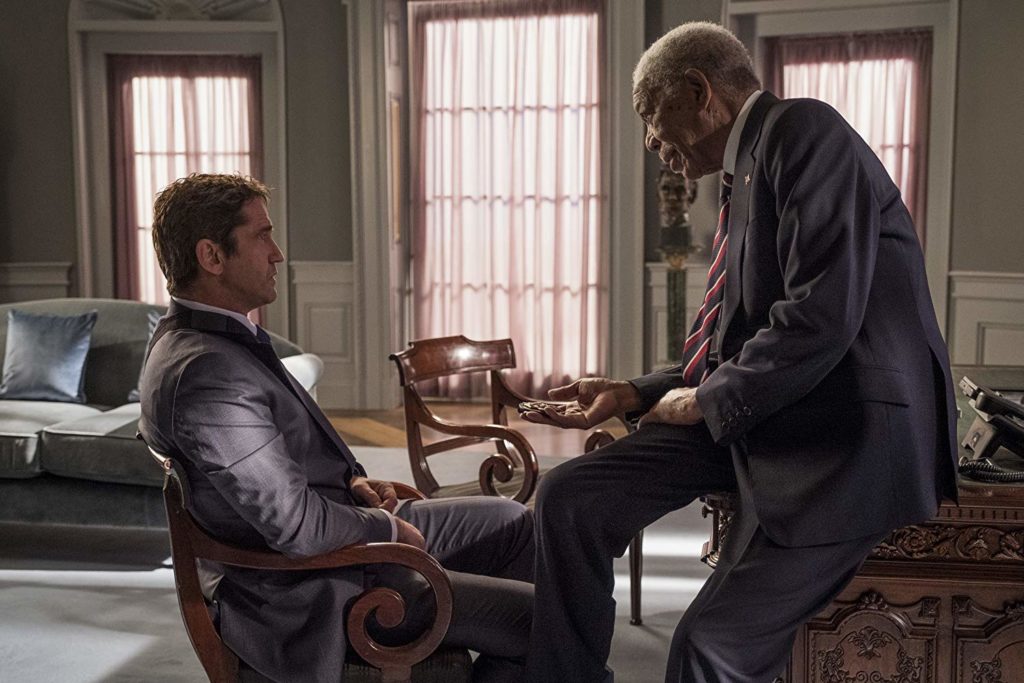
But folks, STAY THROUGH THE CREDITS! There are some great post-credit scenes with Freeman, as well as Butler and Nolte, one which involves pools and peeing. Not to be missed.
Directed by Ric Roman Waugh
Written by Waugh, Matt Cook, and Robert Mark Kamen
Cast: Gerard Butler, Morgan Freeman, Nick Nolte, Danny Huston, Lance Reddick, Jade Pinkett Smith, Tim Blake Nelson, Piper Perabo
by debbie elias, 08/17/2019












